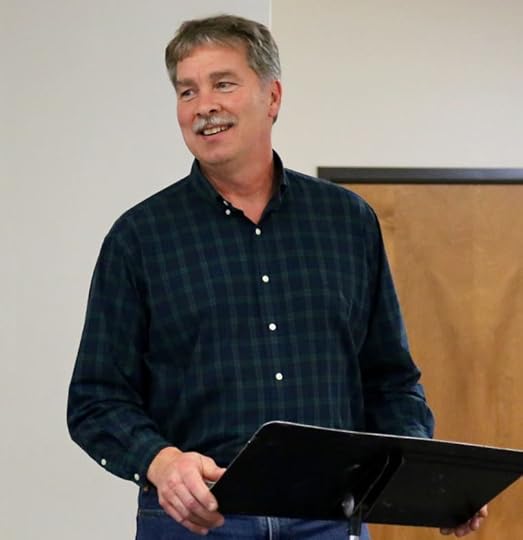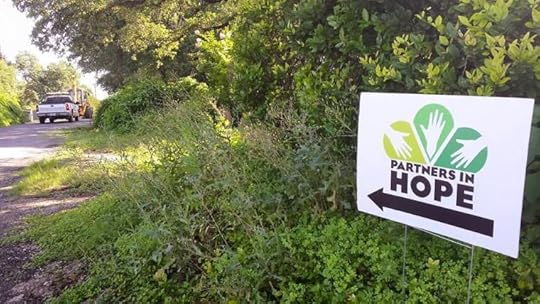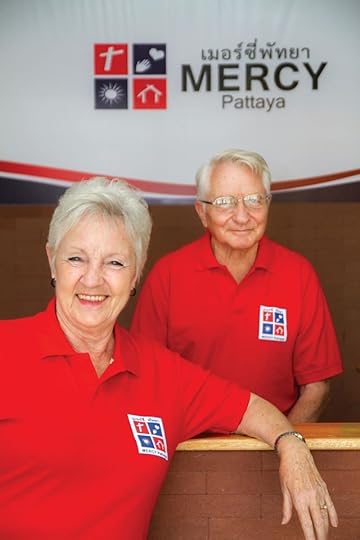Kenneth A. Camp's Blog, page 11
February 3, 2017
Taking A Closer Look at Empowerment—A TBRI Principle
Do you get the idea that it’s good to empower your child but struggle with exactly how to do it? How do you find that balance of empowering yet remaining in control?
[image error]
Trust-Based Relational Intervention, or TBRI, is becoming the standard for connected parenting. Schools, Child Protective Services, counselors, parents, and others recognize this and are applying these principles in their work and families.
I posted a blog a couple of years ago, Three Principles of Trust-Based Relational Intervention, that still gets a lot of traffic. Basically, the three principles are Empowerment, Connection, and Correction. If you want a quick overview of TBRI, please check out that blog post HERE.
Over the next few weeks I will post a blog digging a little deeper into each of the three TBRI principles sharing not only what I have learned about each, but some of my personal experience as I attempt to apply the principles to our family.
In this post, I begin with Empowerment. Basically empowerment means to pay attention to your child’s physical and emotional needs in order to set them up for success. Often our child’s struggles can be overcome by empowering them with the tools they need to succeed.
When my son is acting out or disobeying or not listening or bouncing off the furniture and people…and if I am doing this well, I ask myself, “what does he physically need right now?”. I go down a mental list and even ask him since he is learning to pay attention to his own physical needs. Is he thirsty or hungry? Is he tired? Does he need to move around?
Many times it is something simple like that list that is causing his behavior. If I jump to correcting his behavior, I am treating the symptom instead of the cause. However, when I can attune to his physical and possibly emotional needs, I can help him meet that need. When this is done well, we end up changing the unwanted behavior without having to correct. This approach isn’t ignoring bad behavior, rather it is looking to constructively change the behavior instead of punishing the behavior, if at all possible.
Here is the big catch for me…How well I do this often depends upon how well I am attuned to my own physical needs. When my depleted physical tank collides with my son’s depleted physical tank, yeah, let’s just say it’s not pretty.
Another thing to remember about our kids that come from a hard place is that often these physical needs can trigger a fear response. If your child experienced extreme hunger for example when they feel hunger that can trigger fear that they are about to experience that again. So they freak out or begin hiding food in their bedroom or some other erratic, bizarre behavior.
Again, I can flip my lid, get frustrated, even angry at their behavior and try to correct their craziness (which will probably drive them further into a fear response), or I can work on finding ways to empower them to not only know they won’t go hungry, but actually feel this truth deep down in their core.
Yes, that takes patience, insight, and a long-term view on the solution, which is a healing process, not behavior modification. And yes, progress will happen within the midst of setbacks.
I was thinking about some practical things I have learned over the past five years about empowering my son. Here are a few that come to mind:
Letting my son lead play time. Play therapy is a tool that counselors use to empower a child often so that the child feels safe enough to talk about what is going on in their world. That’s not the only reason I let my son not only choose what we will play, but I let him lead. Currently I find myself marching around the house or on our property as he leads our little army. Or, I am carrying a foam noodle that he deemed as a weapon as we sneak through the woods “deer hunting”.
Proactively providing healthy food and drinks water every couple of hours. Sounds simple, but how well do I do this for myself?
Teaching my son how to pay attention to his body and its needs…and how to meet those needs.
Practicing full body listening. I can tell when my son has my full attention, he does better. He has a strong need to be heard. When I don’t listen well, his behavior denigrates.
I could list many more things I have learned, so if you want to continue digging into the practical ways to empower our kids, start the conversation in the comment section.
If you haven’t gotten your copy of my book, Foster and Adoptive Parenting: Authentic Stories that Will Inspire and Encourage Parenting with Connection, I have a few chapters in the book that address ways we can empower our kids. Get your copy today!
February 2, 2017
How Can We Equip and Send Missionaries Well?An Interview about Launch Global [Podcast 014]
Far too often we send missionaries into a foreign culture without adequate preparation. The result is the missionary returning home long before they had any impact. The causes include lack of financial resources, poor team dynamics, limited knowledge of how to accomplish the mission, marital issues, personal character challenges, and so on.
[image error]
My friend C (I will use only his initial for security reasons) began working with Launch Global a few years ago. I met my friend C a few years ago as we served different churches here in the same city. We had similar roles of equipping people and teams to serve on the mission field either short or long term. I readily admit that C is gifted in this area. I watched as he and his wife took a group of couples through an intensive process to ready them to deploy to the field.
That experience influenced C’s decision to join Launch Global and the work they are doing of “Helping people discover God’s will, develop as a disciple-maker, and deploy for maximum impact.
Listen to today’s podcast interview to not only learn more about what Launch Global is doing, but with an open heart about what your role is in our call to share the Good News around the world.
Show Notes
In the interview we cover some of the following:
Why C and his wife decided to partner with Launch Global. He shares from their experience of serving in an Eastern European country as a young couple.
How Launch Global helps a person through the process of identifying a call to foreign missions, discipling or preparing them for the mission, and deploying to the mission field for maximum impact.
C talks about how Launch Global not only prepares a person or couple to serve on the field, but also how they vet teams in which the new missionary will potentially join. From experience, mission teams need both apostolic and pastoral leadership. The key is matching well missionaries to teams in the field.
C goes in depth about his role as an equipper. C currently serves alongside the staffs of three local churches imbedded into their church culture with the goal of raising up and training missionaries to send.
On a personal note, C shares a word of encouragement to my family along with other listeners that foster and adopt children. His encouragement is to keep on through the tough days because bringing an orphaned or at-risk child into your family is a perfect picture of the Gospel.
Contact information
Because of security, C has asked me to receive any interest you have to contact him directly, either to ask questions or offer pray and financial support. If you are so compelled, please contact me with the contact form below.
Launch Global website – http://www.launchglobal.org
[contact-form]
January 30, 2017
Do You Know How to “Be With” Others Well?
I am the classic introvert. I can ride or drive for hours without saying a word except, “Do you need to stop?” It’s not that I don’t like people. But I get lost in my thoughts and even can feel interrupted if you talk to me.
[image error]
I have improved some, but sometimes I have to purposefully interact with others. It just doesn’t come natural. God, with his sense of humor and, I expect, out of His loving desire to help me grow, first gave me an expressive wife, then years later, a son who wakes up talking until the moment his eyes close with sleep at night.
Being with. A simple phrase, but how well are we at “being with” other people? It’s a lot more than simply talking to them, acknowledging them, or even tolerating them.
Here are three ways we can “be with” someone well:
Fully present – Where is your mind when you are with another person? How often are you thinking about something from your past, either recent or distant? If you aren’t thinking about something from the day before or years past when you are with someone, you probably are thinking, or worrying, about what is going to happen in the future. Both our past and future thoughts can rob us from being fully present with the person we are with in the moment. If you are like me, being fully present with someone takes intentional effort.
Respect – In order to be fully present with someone, we need first to respect them. If we don’t respect them, we won’t put in the effort.
Value – It boils down to whether we place value on another person’s life. Many of our relational challenges stem from our basic lack of value we place on another person. This is true for family, friends, or for sure strangers.
Four areas I work on “being with” others well:
As a husband – After almost 29 years of marriage, Danielle can usually tell if I am fully present with her as I can with her. Many marriage conflicts can be avoided simply by practicing “being with” each other. A friend of ours shared a simple and profound thing they have been doing lately. Ready for it? They stopped turning on the TV at night and talked to each other. Whoa!
As a father – I have shared before how my son will often make sure that I am looking at him when he wants to show me something. It’s sad how technology like smart phones has created more disconnect from our children. If we want our children to listen to us, maybe they will more if we put aside our distractions and give them what we ask of them when they are little—”full-body listening”.
As a friend – Sometimes our friends just need for us to “be with” them. They don’t need advice or to hear our story that is somehow related to what is going on with them. Yes, it involves listening, but it’s more than that.
As a stranger – It saddens me as I watch people lose the ability to interact with each other with decency. Maybe throughout history this has been cyclical. Regardless, it is severally lacking today. In order to “be with” a stranger well is to be okay with someone who is different than you. You don’t forfeit your worldview when you show respect and value to a person with a different one.
Simple ways you can work on “being with” others well today:
Take a few minutes and listen by putting aside any distraction and looking into a stranger or friend’s eyes as they talk to you.
Follow my friend’s example and don’t turn on the TV tonight, or your computer, or your smart phone…and spend 30 minutes just talking to your spouse.
If you have children at home, set aside time today before they go to bed to do something they want to do. I know, that might be near impossible if they are a teenager, but at least make an attempt.
What is another way you would add to that list?
January 26, 2017
Find One Reason to Say Yes. An Interview with Jason Johnson. [Podcast 013]
I began following Jason Johnson’s blog a few years ago when a mutual friend told me about his site. I appreciate Jason’s practical approach to foster care and adoption. His communication style cuts straight to the heart of the matter whether you are considering becoming a foster or adoptive parent or if you already have children from a hard place in your home.
[image error]
Jason Johnson
I wanted to get to know Jason a little better and give you the same opportunity.
[image error]
Jason, Emily, and their four daughters
Here are a few things we cover in the podcast:
Jason’s family involvement with foster care and adoption including he and his wife being “grandparents” in their 30s.
How Jason and his wife decided to begin fostering about five years ago.
We talk about what Jason has done over the past few years to help many other families and churches embrace a ministry to children from a hard place.
Jason gives two powerful bits of encouragement for foster and adoptive parents.
For those who are considering foster care or adoption and are waiting for the day you are ready, Jason has a word for you too.
Jason shares about resources he and others have created for the purpose of helping churches and families. These can be found on his website (link below).
We finish the interview with a plug for a conference that Jason is speaking at on February 25 in Austin, Texas—A Future and A Hope .
Contact Information
Website—http://jasonjohnsonblog.com
Facebook—https://www.facebook.com/jasonjohnsonblog
A Future and A Hope Conference—https://www.fosteringhopeaustin.org/afah-conference/
January 19, 2017
13 Challenges Foreign Missionaries Face
We send them to every part of the world. We support them financially. We pray for them from time to time. But do we know what challenges they face?

Sometimes I think that we view missionaries as different than we are. Maybe more spiritual or gifted differently. I don’t think they are any different than you or me.
The one thing that I notice is different between someone who goes to a foreign mission field and someone who doesn’t is…Availability. It’s not just availability. It is a willing and submitted heart.
It is important for us who are senders to understand the best we can what the challenges are that our missionaries face so we can effectively pray for and support them.
As I have said before…We all are a part of this mission.
I reached out to a few of my missionary friends and asked them about the challenges they face. Everyone shared with great vulnerability. They want you to understand enough so you can interceded powerfully for them.
As you read through this list, think of missionaries you know personally, maybe even support financially. I encourage you to reach out to them and ask them if they want share anything with you so you can intercede on their behalf.
13 Challenges Missionaries Face:
Language acquisition. Of course it is important to learn the language so you can share with them. This takes time and effort. However, most missionaries struggle with learning the language.
Not trained for the work they are doing. Can you imagine the frustration trying to do work you didn’t get training for? Missionaries who work in closed countries have to have a legitimate reason to live there. Often these missionaries go from one business idea to another until they find one that works.
Character issues. Anytime a person is in a pressure cooker situation, character issues will surface. The most common for men is porn addiction. For women it is unforgiveness and comparison.
Team Struggles. Every missionary responded with this one. Team dynamics can make a missionary’s work stressful and distract from the actual mission. Common struggles are disunity, lack of leadership, mismatched personalities and talents, unwillingness among members to compromise, and culture shock related stress.
Lack of financial support. Most missionaries need to raise financial support. Some sending organizations won’t send a missionary until they are 100% supported; however, some will send before. This makes it challenging when a missionary has to continue to raise support while adjusting to a new culture, learning a new language, and working.
Lack of resources. Different from personal financial support.
Flexibility. You might hear that it’s good to be flexible like a rubber band. One missionary friend put it this way,
“a rubber band will eventually lose its elasticity or break. A missionary needs to be fluid.”
Culture shock. If you have traveled or worked in a foreign country, you understand this. For a missionary it also includes downsizing of personal space, limited access to amenities like medical services, reliable utilities, and so on. Another cultural challenge is misunderstanding because of different cultural norms.
Disappointment. Anytime a person begins something new expectations are high. This is same for a missionary. Over time disappointment settles in. A missionary eventually has to either moderate their expectations or they become disillusioned. This is one thing that contributes to a missionary leaving the field before they see tangible results.
Isolation. Another common response I got was isolation. This happens because of a lack of ex-pats, infrequent contact with friends from home, and lack of longterm relationships. A missionary also suffers from spiritual isolation that can lead to a crisis of faith.
Marriage tension. Take the challenges of marriage and intensify it manifold for a missionary couple serving overseas.
Parenting. Deciding how to educate, teaching social skills, finding friends, criticism from local culture, helping children navigate their own culture shock all make parenting challenging for missionaries in a foreign country.
Spiritual attack. Of course with the reality of spiritual warfare, the last thing the enemy wants is for a missionary to have success. Many of these on this list are caused by spiritual attack at some level.
If you are a missionary, and you want to comment or add to this list please do so in the comment section if you can.
I hope that those who read this that have sent or support missionaries in foreign countries will intercede for them with a better understanding of the challenges they face. We need to do well at sending!
Our Son’s Struggle to Attach [Podcast 012]
Attachment between a child and his or her parents is powerful. How healthy that attachment is will determine how healthy all other relationships are and will be.

Usually when a child comes into a family from foster care or through adoption, they aren’t able to attach easily. This is true regardless of their age.
In today’s podcast episode, Danielle and I openly share about not only how it was hard for our son to attach to Danielle, but also how Danielle felt about the struggle.
Here are a few of the things we touch on…
What we call the “Trauma Dance”
Two stories that illustrate the struggle of attaching…
Running past Danielle to me when our son got hurt
Our son asking other families if he could go home with them
The challenge of parenting a child who isn’t attached to you
Why our son would ask me, “Are you my Daddy?”
A reminder of how our own attachment style impacts our parenting
Ways Danielle intentionally worked on building a healthy attachment with our son
intentional play time with lots of eye contact
words of affirmation
intercession
recapturing lost moments of attachment that usually happens the first year of life
Danielle wraps up the conversation with a heartfelt word of encouragement for other foster and adoptive mothers
If you enjoyed this podcast, will you do me a favor? Click the link above that allows you to subscribe to the podcast on iTunes. Then on the iTunes page, leave an honest Rate and Review. This will bring more attention to this podcast. Thank you!
January 16, 2017
Please Take My 2017 Reader Survey
I want to give you the kind of content that you enjoy and can use in your daily life. In order to do that well, I need to know more about you. That’s why I am asking you to take 3 minutes and take my Reader Survey.

Will you please take a few minutes and fill out the survey? This will help me create the best content possible for you.
Your input is important to me. The survey is easy to fill out, and it is completely anonymous. It will only take about 3 minutes.
Yes! I will take the survey.
Thank you for your help!
January 12, 2017
You Don’t Have to Go Across Town or the World: An Interview with Matt Peacock [Podcast Episode 011]
Partners in Hope Lake Travis Executive Director
My path has crossed many times with Matt Peacock over the past several years. One of those times happened in 2011. As Matt and I drove back from a conference in South Texas, he began sharing a vision he had about a non profit ministry that went out and found those in need in his community instead of waiting for them to reach out for help.

Matt Peacock, executive director of Partners in Hope Lake Travis
Then he invited me to join the inaugural board. Sneaky. I liked what I heard and wanted to help get this off the ground, so I agreed.
In today’s podcast interview, you get to hear some of the back story, the mission of Partners in Hope, stories of hope, and how you can be a part of this ministry. Even if you don’t live in the Austin area, you will benefit from what Matt shares, because you can do the same thing in your community.

Sign showing the way to a Family Work Day
Show Notes
Matt shares how the ministry began as a weekly outreach called SNOW days. Listen to find out what a SNOW day is.
If you have ever thought about starting a 501 (c) 3 you will find the history of how Partners in Hope (PIH) began helpful.
Matt talks about how the mission changed as they understood better their role in the community.
Listen to how the relationship with a single mother did much more than just help out around her home for one day. This includes how she continues to give back to her community.
Hear how another family who PIH partnered with uses their talents to help other families.
I mention a project that Matt and I plan to work on soon that will help others begin a ministry like Partners in Hope Lake Travis right in the community that they live in.
Learn how you can partner with Partners in Hope Lake Travis.
Contact Information
Partners in Hope Lake Travis website – http://partnersinhopelaketravis.org
Facebook – https://www.facebook.com/Partners-in-Hope-Lake-Travis-258521320860199/
Matt Peacock email – mattbp61@gmail.com
January 9, 2017
7 Ways You Are Making Parenting A Foster or Adopted Child Hard
Parenting might be the hardest thing in the world. And if you bring a child into your home who isn’t your biological child and is dealing with all kinds of wounds, and you just raised the bar.

Many times we enter into a relationship with a wounded child and think that we can parent them just like we do or would parent a biological child. It simply isn’t true.
I know some foster or adoptive parents don’t deal with challenges with the children that they have brought into their home. However, most do. And about the time you think you have overcome those challenges, other stuff comes to the surface, or you enter into another season of life, or the dynamics of your home changes.
It is enough to make a foster or adoptive parent wonder about their own sanity. If you aren’t a foster or adoptive parent, I am not exaggerating.
What I have seen in my own parenting, and in others, is that we, most of the time unintentionally, make our parenting harder than it needs to be.
Here are 7 ways we tend to make parenting harder:
Trying to do too much at once. This takes on many forms, such as, over-commitment. Over commitment is close to epidemic proportions for all families. None of our kids need to be involved in every activity available. Our kids from a hard place really don’t need that. Another way we try to do too much is by taking in too many wounded children at the same time. I know you see the need and so many others ignore it, but you just can’t save them all. All that does is cause more harm for the ones already a part of your family.
Caring too much about what other people think. This is common for a lot parents. When we care too much about what others think, we second guess our parenting decisions. Truth is that you know your child and situation better than anyone…even the experts.
Expecting healing to happen fast. A common misnomer for foster and adoptive parents is that once we bring a child into our home they will heal quickly because of a safe and loving environment. Part of that is true. They will heal. But it takes time. And, you will move forward three steps and backward two steps. You will cycle through things as your child transitions from one stage of life to another. Some things will remain challenging their entire life.
Ignoring your own baggage. I dedicate a whole section to this in my new book, Foster and Adoptive Parenting: Authentic Stories that Will Inspire and Encourage Parenting with Connection. Bottom line is that our wounds will collide with our child’s wounds. Ignoring or minimizing what we bring to the relationship only sets up the relationship for failure. My friend, Marchall Lyles, calls this having a compassionate curiosity about our own history. What I have found is if I can do this I am much more compassionate toward my son.
Resisting help and support. Foster and adoptive parents are “can-do” kind of people. That makes it hard to ask for or seek out help and support. Trying to parent a child from a hard place is exhausting and lonely.
Focusing on the wrong thing. This can include a lot of things like focusing on the “cause” instead of the child. Another is focusing on behavior modification rather than on longterm solutions.
Leaving God out of the equation. The one who knows your child the best is the One who created him or her. I know that it’s difficult if you don’t believe in God or if you feel hurt by Him. However, He is called Father for a reason. He loves us as the perfect parent. We should turn to Him long before and much more often than we do the parenting experts.
The over-arching idea here is that we can make parenting harder than it needs to be. Yet if we will simplify life, let what others think roll off our back, give our kids ample time to heal, have a compassionate curiosity about our own baggage, seek and receive help and support, focus appropriately on our kids, and look to the Creator and Sustainer of all to help us parent, I think we might be able to do this parenting a wounded child thing!
I would love to hear back from you about this, especially if you have something to add to this list or want to discuss one of these further. Either leave a comment below or like my Facebook Author page and join the conversation there.
January 5, 2017
Are You Available? An Interview with Fred and Dianne Doell [Podcast Episode 010]
You ever know someone that every time you are around them you leave feeling better? That is how I feel about Fred and Dianne Doell. Whether it was when we lived in Thailand, were back on a visit, in an email, or like the privilege I had here to talk to them on Skype, I always feel encouraged. They always see your potential, and they call it out in a positive and uplifting way.

Danielle and I met Fred and Dianne in 2006 when we went to Pattaya, Thailand on a 10 day mission trip. One of those days was spent at Mercy Center, a children shelter, run by Fred and Dianne.

Baptizing a new believer
I know you will enjoy their sense of humor and passion for living out God’s call on their lives. You will also be challenged to look at what you are doing with your own life…but there is nothing wrong with that!
Show Notes
Fred shares a little of their history along with their call to serve in Thailand. I love this quote from Fred, “I was fine with staying in Canada and getting covered up with snow.”
Dianne makes a simple but profound statement, “We read what Jesus said to do, and we did that to the best of our ability.”
Both Fred and Dianne share how each of their ministries got started. You might be surprised!
Here are some of the ministries they began in Thailand:
Several churches
Meeting needs of people living in slums
Prison ministry
Children’s shelter
Equipping ministry
Fred and Dianne share how we can give prayer and financial support
Dianne gives an update about their adopted 12 year-old son
Dianne talks about my new book—Foster and Adoptive Parenting: Authentic Stories that Will Inspire and Encourage Parenting with Connection
Contact Information
Living Word Missions – This is where you can support Fred and Dianne Financially
Mercy Center website – http://mercypattaya.com
Church information – http://www.encounterchurchasia.com
Email – fddoell@gmail.com
Facebook (Dianne) – https://www.facebook.com/dianneinthailand
Facebook (Fred) – https://www.facebook.com/fred.doell



